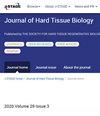低浓度依托泊苷通过激活Pin1诱导MG63细胞成骨
IF 0.4
4区 医学
Q4 ENGINEERING, BIOMEDICAL
引用次数: 0
摘要
本研究旨在检测低浓度依托泊苷是否可以通过基因敲低方法激活人MG63细胞中的肽基脯氨酸异构酶Pin1来加速成骨。0.1 μM etopo苷处理24h后,MG63细胞活力不降低,细胞衰老不发生;然而,与未处理的对照细胞相比,γ - h2ax染色的细胞核百分比显著增加,这表明0.1 μM依托泊苷在细胞中诱导了弱的DNA损伤反应(DDR)。在成骨诱导培养基(OIM)培养的MG63细胞中,0.1 μM依托泊苷处理加速了成骨,与未处理依托泊苷的细胞相比,Runx2和Osterix的表达增加,碱性磷酸酶(ALP)染色增强。除了这些成骨标志物外,在依托泊苷处理的细胞中,Pin1的表达也上调,这表明弱DDR可能在Pin1激活和成骨标志物之间提供了相互作用。RNA干扰介导的Pin1沉默抑制了0.1 μM依托泊苷预处理的oim培养细胞中成骨标志物的表达和ALP染色。基于这些发现,我们认为低浓度依托泊苷诱导轻度DDR激活Pin1,最终促进oim诱导的MG63细胞成骨。本文章由计算机程序翻译,如有差异,请以英文原文为准。
Low Concentration of Etoposide Induces Enhanced Osteogenesis in MG63 Cells via Pin1 Activation
: This study aimed to examine whether a low concentration of etoposide can accelerate osteogenesis via the activation of peptidyl-prolyl isomerase Pin1 in human MG63 cells using a genetic knockdown approach. MG63 cells treated with 0.1 μM etoposide for 24 h showed neither reduction in cell viability nor induction of cellular senescence; however, there was a significant increase in the percentage of nuclear staining with γH2AX as compared with that in untreated control cells, indicating that 0.1 μM etoposide induces weak DNA damage response (DDR) in the cells. Treatment with 0.1 μM etoposide accelerates osteogenesis in osteogenic induction medium (OIM)-cultured MG63 cells, demonstrating increased expression of Runx2 and Osterix and intense alkaline phosphatase (ALP) staining, as compared with cells treated without etoposide. In addition to those osteogenic markers, Pin1 expression was upregulated in the etoposide-treated cells, suggesting that the weak DDR may provide an interaction between Pin1 activation and osteogenic markers. The RNA interfer -ence-mediated silencing of Pin1 suppressed the expression of osteogenic markers and ALP staining in the OIM-cultured cells pretreated with 0.1 μM etoposide. Based on these findings, we suggest that a low concentration of etoposide induces mild DDR to activate Pin1, eventually promoting OIM-induced osteogenesis in the MG63 cells.
求助全文
通过发布文献求助,成功后即可免费获取论文全文。
去求助
来源期刊

Journal of Hard Tissue Biology
ENGINEERING, BIOMEDICAL-
CiteScore
0.90
自引率
0.00%
发文量
28
审稿时长
6-12 weeks
期刊介绍:
Information not localized
 求助内容:
求助内容: 应助结果提醒方式:
应助结果提醒方式:


